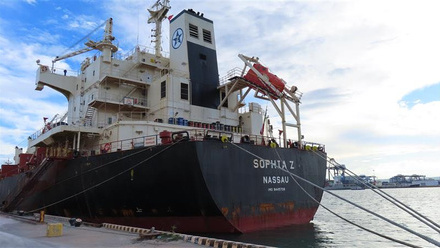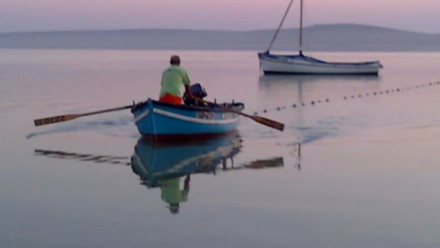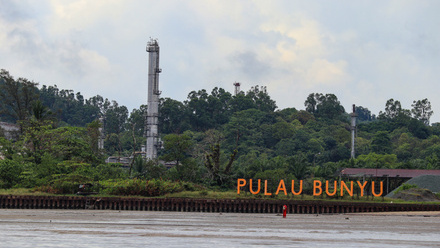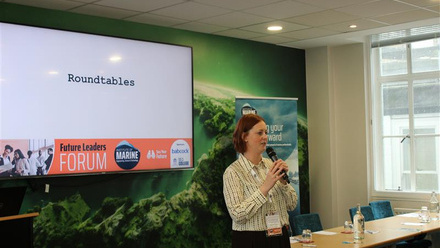Fatigue failings
When a tanker hit an oil and gas platform off Louisiana, investigators found that the sleep-deprived master had taken over command shortly beforehand — with no proper handover.
In October 2020, the Maltese-registered crude oil tanker Atina was attempting to anchor, at night, off the coast of Louisiana, USA, when it struck the stationary oil and gas platform, SP-57B — an incident that caused combined damage to the two assets of around $73m.
The 273m (898ft) tanker had been trying to anchor just 0.7 miles from SP-57B — which Atina’s master believed to be a sufficiently safe distance from the working platform.
However, as his crew began lowering the anchor, the local pilot station asked Atina to move to a different, safer, location. While the crew began hauling the anchor back in, Atina’s bridge team lost track of SP-57B’s location — and their relative position to it — then quickly confused it with another nearby stationary vessel. Atina’s master was also not fully accounting for the strong current and winds that were pushing his ship toward the platform.
Preoccupied with bringing in the anchor, Atina’s master then ordered hard starboard rudder while SP-57B was on Atina’s starboard quarter, with the wind now coming straight onto his ship from dead ahead. In doing so, he ended up pivoting Atina towards SP-57B while putting the wind and current onto Atina’s port side, causing Atina to set towards the platform.
As the platform’s relative position to Atina shifted from the tanker’s starboard quarter to its starboard bow, with the ship pivoting about its anchor chain, the combination of set and Atina moving ahead brought the tanker closer and closer to SP-57B, then faster and faster as the amount of chain in the water lessened and the tanker gathered speed. According to parametric data retrieved from Atina’s VDR (voyage data recorder), Atina’s starboard side eventually hit SP-57B at 3.8 knots.

(FleetMon)
Significant damage
Immediately after the strike, the crew aboard SP-57B assessed the damage to the platform and initiated emergency procedures to shut down the equipment that was removing oil and natural gas from beneath the seafloor and then pumping it ashore. A short time later, a rescue helicopter lifted SP-57B’s crew to the safety of another nearby manned platform.
As a result of the collision, Atina sustained damage to its starboard accommodation ladder and indentations to the hull plating on two of its ballast tanks. SP-57B, meanwhile, sustained several fractured, severed and crushed structural members above and below the waterline.
No pollution or injuries were reported due to the incident, but the damage to SP-57B was estimated to be $72.3m, while the damage to Atina was estimated to be at least $598,400.
Hampered handover
The master later told accident investigators from the National Transportation Safety Board (NTSB) that he had wanted to anchor the ship as soon as possible after the local pilot had left the tanker because he was feeling tired. He explained that he had taken over command of the ship shortly before the accident, having just flown in from his home in Turkey.
The long-distance travelling meant he had had no proper sleep in the 24-hour period before the accident, and only 19 hours sleep during the 96-hour period before taking command.
The master also explained that when he boarded the tanker, he only saw the departing master very briefly — as the departing master was stepping onto a launch to leave the ship.
Having had no handover, he was then required to take command of the vessel, at night, having just travelled for more than 50 hours. He had never been aboard Atina before.

(Shutterstock)
Report conclusions
The NTSB investigation report found that Atina’s master was, at the time of the incident, having to deal with critical manoeuvres while deeply affected by acute fatigue — which occurs when a person has had less than four hours of sleep over a 24-hour period.
The report also points out that this happened despite the fact that Atina’s operating company’s SMS (safety management system) clearly stated that a minimum handover of at least one day was required between senior personnel aboard any company vessel.
The NTSB therefore determined that the probable cause of the incident was Atina’s operating company’s failure to ensure sufficient time for a proper handover, which resulted in the master’s acute fatigue and poor situational awareness during an attempted night-time anchoring manoeuvre. A proper handover, it says, would have allowed him to rest properly and receive his counterpart’s handover information in good time.
The report goes on to recommend that all vessel operating companies should ensure that joining crewmembers and personnel are given the opportunity to obtain a sufficient handover period and adequate rest before they are required to take over critical shipboard duties, such as navigation, that could impact the safety of the crew, assets or environment.
Read the full NTSB accident report.
Join the IMarEST’s Seafarer Mental Health & Wellbeing Special Interest Group to raise awareness and promote mental health and wellbeing and the Human Element Working Group to improve safety and reduce the risk of operational incidents. Log into your My IMarEST account, click on My Special Interest Groups and then tick the boxes of the SIGs you’d like to join. You can then also join the groups on Nexus, our networking platform.

Dennis O’Neill is a freelance journalist specialising in maritime.






